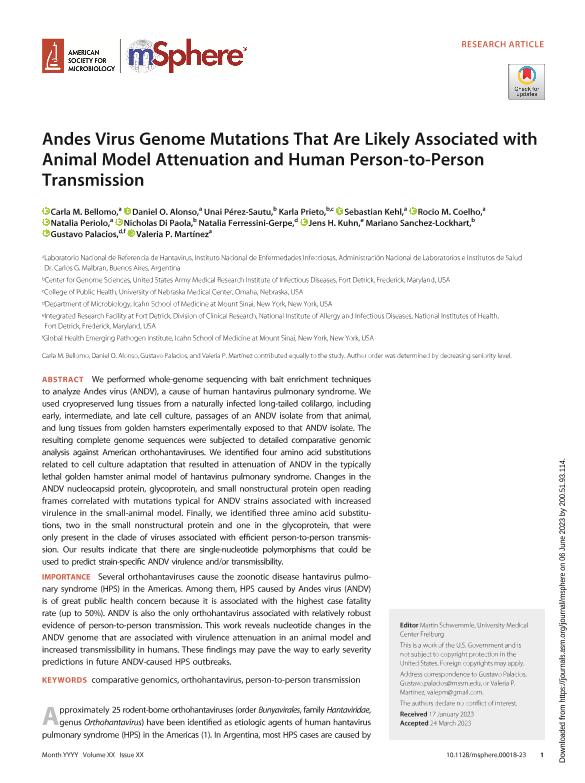Mostrar el registro sencillo del ítem
dc.contributor.author
Bellomo, Carla María

dc.contributor.author
Alonso, Daniel O.
dc.contributor.author
Pérez Sautu, Unai
dc.contributor.author
Prieto, Karla
dc.contributor.author
Kehl, Sebastian Dario

dc.contributor.author
Coelho, Rocío María

dc.contributor.author
Periolo, Natalia

dc.contributor.author
Di Paola, Nicholas
dc.contributor.author
Ferressini Gerpe, Natalia
dc.contributor.author
Kuhn, Jens H.
dc.contributor.author
Sanchez Lockhart, Mariano
dc.contributor.author
Palacios, Gustavo
dc.contributor.author
Martinez, Valeria Paula

dc.date.available
2023-12-13T14:52:41Z
dc.date.issued
2023-04
dc.identifier.citation
Bellomo, Carla María; Alonso, Daniel O.; Pérez Sautu, Unai; Prieto, Karla; Kehl, Sebastian Dario; et al.; Andes Virus Genome Mutations That Are Likely Associated with Animal Model Attenuation and Human Person-to-Person Transmission; American Society for Microbiology; mSphere; 8; 3; 4-2023; 1-14
dc.identifier.issn
2379-5042
dc.identifier.uri
http://hdl.handle.net/11336/220138
dc.description.abstract
We performed whole-genome sequencing with bait enrichment techniques to analyze Andes virus (ANDV), a cause of human hantavirus pulmonary syndrome. We used cryopreserved lung tissues from a naturally infected long-tailed colilargo, including early, intermediate, and late cell culture, passages of an ANDV isolate from that animal, and lung tissues from golden hamsters experimentally exposed to that ANDV isolate. The resulting complete genome sequences were subjected to detailed comparative genomic analysis against American orthohantaviruses. We identified four amino acid substitutions related to cell culture adaptation that resulted in attenuation of ANDV in the typically lethal golden hamster animal model of hantavirus pulmonary syndrome. Changes in the ANDV nucleocapsid protein, glycoprotein, and small nonstructural protein open reading frames correlated with mutations typical for ANDV strains associated with increased virulence in the small-animal model. Finally, we identified three amino acid substitutions, two in the small nonstructural protein and one in the glycoprotein, that were only present in the clade of viruses associated with efficient person-to-person transmission. Our results indicate that there are single-nucleotide polymorphisms that could be used to predict strain-specific ANDV virulence and/or transmissibility. IMPORTANCE Several orthohantaviruses cause the zoonotic disease hantavirus pulmonary syndrome (HPS) in the Americas. Among them, HPS caused by Andes virus (ANDV) is of great public health concern because it is associated with the highest case fatality rate (up to 50%). ANDV is also the only orthohantavirus associated with relatively robust evidence of person-to-person transmission. This work reveals nucleotide changes in the ANDV genome that are associated with virulence attenuation in an animal model and increased transmissibility in humans. These findings may pave the way to early severity predictions in future ANDV-caused HPS outbreaks.
dc.format
application/pdf
dc.language.iso
eng
dc.publisher
American Society for Microbiology

dc.rights
info:eu-repo/semantics/openAccess
dc.rights.uri
https://creativecommons.org/licenses/by-nc-sa/2.5/ar/
dc.subject
COMPARATIVE GENOMICS
dc.subject
ORTHOHANTAVIRUS
dc.subject
PERSON-TO-PERSON TRANSMISSION
dc.subject.classification
Virología

dc.subject.classification
Ciencias Biológicas

dc.subject.classification
CIENCIAS NATURALES Y EXACTAS

dc.title
Andes Virus Genome Mutations That Are Likely Associated with Animal Model Attenuation and Human Person-to-Person Transmission
dc.type
info:eu-repo/semantics/article
dc.type
info:ar-repo/semantics/artículo
dc.type
info:eu-repo/semantics/publishedVersion
dc.date.updated
2023-12-12T13:11:01Z
dc.journal.volume
8
dc.journal.number
3
dc.journal.pagination
1-14
dc.journal.pais
Estados Unidos

dc.description.fil
Fil: Bellomo, Carla María. Dirección Nacional de Instituto de Investigación. Adm.nacional de Laboratorio E Instituto de Salud "dr.c.g.malbran". Instituto Nacional de Enfermedades Infecciosas. Departamento de Virologia; Argentina
dc.description.fil
Fil: Alonso, Daniel O.. Dirección Nacional de Instituto de Investigación. Adm.nacional de Laboratorio E Instituto de Salud "dr.c.g.malbran". Instituto Nacional de Enfermedades Infecciosas. Departamento de Virologia; Argentina
dc.description.fil
Fil: Pérez Sautu, Unai. No especifíca;
dc.description.fil
Fil: Prieto, Karla. No especifíca;
dc.description.fil
Fil: Kehl, Sebastian Dario. Dirección Nacional de Instituto de Investigación. Adm.nacional de Laboratorio E Instituto de Salud "dr.c.g.malbran". Instituto Nacional de Enfermedades Infecciosas. Departamento de Virologia; Argentina
dc.description.fil
Fil: Coelho, Rocío María. Dirección Nacional de Instituto de Investigación. Adm.nacional de Laboratorio E Instituto de Salud "dr.c.g.malbran". Instituto Nacional de Enfermedades Infecciosas. Departamento de Virologia; Argentina
dc.description.fil
Fil: Periolo, Natalia. Dirección Nacional de Instituto de Investigación. Adm.nacional de Laboratorio E Instituto de Salud "dr.c.g.malbran". Instituto Nacional de Enfermedades Infecciosas. Departamento de Virologia; Argentina. Consejo Nacional de Investigaciones Científicas y Técnicas; Argentina
dc.description.fil
Fil: Di Paola, Nicholas. No especifíca;
dc.description.fil
Fil: Ferressini Gerpe, Natalia. No especifíca;
dc.description.fil
Fil: Kuhn, Jens H.. No especifíca;
dc.description.fil
Fil: Sanchez Lockhart, Mariano. No especifíca;
dc.description.fil
Fil: Palacios, Gustavo. No especifíca;
dc.description.fil
Fil: Martinez, Valeria Paula. Dirección Nacional de Instituto de Investigación. Adm.nacional de Laboratorio E Instituto de Salud "dr.c.g.malbran". Instituto Nacional de Enfermedades Infecciosas. Departamento de Virologia; Argentina
dc.journal.title
mSphere
dc.relation.alternativeid
info:eu-repo/semantics/altIdentifier/url/https://journals.asm.org/doi/10.1128/msphere.00018-23
dc.relation.alternativeid
info:eu-repo/semantics/altIdentifier/doi/http://dx.doi.org/10.1128/msphere.00018-23
Archivos asociados
